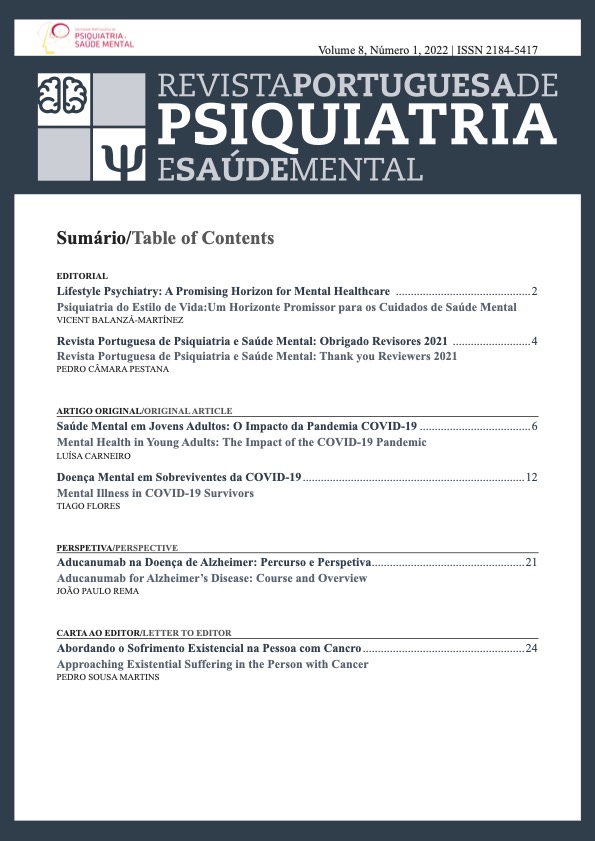Mental Health in Young Adults: The Impact of the COVID‐19 Pandemic
DOI:
https://doi.org/10.51338/rppsm.248Keywords:
COVID‐19, Mental Health, Pandemics, Young AdultAbstract
Introduction: When we talk about young adults we tend to consider them as a population in good health. However, in recent times, the transition from adolescence to adulthood has been the focus of attention to implement strategies for health promotion and disease prevention. The aim of this study was to understand the health status of a young adult population attending higher education and, in what way, the pandemic by COVID‐19 had an impact on the different dimensions of daily life, namely on well‐being and mental health.
Methods: A questionnaire was applied and disseminated electronically by young people in university education and 149 responses were obtained.
Results: The students showed some feelings of low personal fulfilment (28% say they feel unfulfilled), feelings of loneliness (26% say they feel alone), feelings of depression (42% say they feel depressed), lack of confidence in themselves (17%) and
in some cases feel that their energy levels are low or extremely low (26%).The pandemic context brought several challenges to young adults who had difficulty making new friends (94%), the perception of feelings of nervousness, anxiety or tension during confinement was reported by 51% of students and the inability to control their concerns or emotions was reported by 43%.
Conclusion: Several studies report mental changes that can develop or worsen after traumatic events such as a pandemic, and the results of our study are in line with this evidence. Feelings of nervousness, tension and anxiety, as well as difficulty in controlling emotions, emerged in association with the pandemic, emphasizing the need to develop health strategies that respond to these emerging needs.
Downloads
References
Morganstein JC, Fullerton CS, Ursano RJ, Donato D, Holloway HC. Pandemics: Health Care Emergencies. In: Ursano RJ, Fullerton CS, Weisaeth L, Raphael B, eds. Textbook of Disaster Psychiatry. 2nd ed. Cambridge: Cambridge University Press; 2017:270‐84. doi:10.1017/9781316481424.019
Charles NE, Strong SJ, Burns LC, Bullerjahn MR, Serafine KM. Increased mood disorder symptoms, perceived stress, and alcohol use among college students during the COVID‐19 pandemic. PsyArXiv, 2020:1‐38. https://doi.org/10.31234/osf.io/rge9k
Carneiro A. Impactos da COVID‐19 em jovens adultos: O papel moderador da satisfação com o suporte social na relação entre stress e comportamentos de risco [Master thesis]. Instituto Universitário de Lisboa: ISCTE; 2020. [consultado Jan 2021] Disponível em: https://repositorio.iscte‐iul.pt/handle/10071/21523
Enumo SR, Weide JN, Vicentini EC, Araujo MF, Machado WL. Enfrentando o estresse em tempos de pandemia : proposição de uma Cartilha Coping with stress in times of pandemic : a booklet proposal. Estud Psicol. 2020; 37:1‐10. doi:10.1590/1982‐0275202037e200065 Oliveira W, Silva JL, Andrade AL, Micheli D, Carlos DM, Silva MA. A saúde do adolescente em tempos da COVID‐19 : scoping review. Cad Saúde Pública. 2020;36:e00150020. doi:10.1590/0102‐311X00150020
Taylor S. The psychology of pandemics: Preparing for the Next Global Outbreak of Infectious Disease. United kingdom: Cambridge Scholars Publishing; 2019.
Costa A, Rasga C, Martiniano H, Vicente A, Virgolino A, Santos O, et al. Saúde mental em tempos da pandemia da COVID‐19 : abordagem metodológica utilizada no projeto SM‐COVID19. Observ Bol Epidemiol. 2020; 12. 40‐5. [consultado Jan 2021] Disponível em: https://repositorio.ul.pt/bitstream/10451/45969/1/ Mental_pandemia.pdf.
Son C, Hegde S, Smith A, Wang X, Sasangohar F. Effects of COVID‐19 on College Students’ Mental Health in the United States: Interview Survey Study. J Med Internet Res. 2020;22:e21279. doi:10.2196/21279.
LiangL, Ren H, Cao R, HuY, QinZ, LiC, MeiS. The Effect of COVID‐19 on Youth Mental Health. Psychiatr Q. 2020;91:841‐52. doi: 10.1007/s11126‐020‐09744‐3.
Chaleta E, Grácio L, Rosário P. Aprendizagem no ensino superior – a relação entre cognição, sentimentos e motivação dos estudantes. In: Trindade V, Trindade N, Candeias A, editores. A Unicidade do Conhecimento . Évora: Universidade de Évora; 2009. [consultado Jan 2021] Disponível em: http://pt.scribd. com/doc/13107500/aprendizagem‐no‐ensinosuperior‐ ‐a‐relacao‐entre‐acognicao‐os‐sentimentos‐e‐a‐motivacao‐dos‐estudantes.
Milojevich HM, Lukowski AF. Sleep and Mental Health in Undergraduate Students with Generally Healthy Sleep Habits. PLoS One. 2016;11:e0156372.
doi: 10.1371/journal.pone.0156372.
International Labour Organization. Executive Summa‐ ry of the survey report: Youth and Covid‐19 impacts on jibs, education, rigths and mental well‐being. Genève: ILO; 2020.
Dias E, Pinto FCF. A Educação e a Covid‐19. Ens Aval Pol Públ Educ. 2020; 28:545‐54. doi:10.1590/ S0104‐40362019002801080001.
Loades ME, Chatburn E, Higson‐sweeney N, Reynolds S, Shafran R, Brigden A, et al. Rapid Systematic Review : The Impact of Social Isolation and Loneliness on the Mental Health of Children and Adolescents in the Con‐ text of COVID‐19. J Am Acad Child Adolesc Psychiatry. 2020;59:1218‐39.e3. doi:10.1016/j.jaac.2020.05.009








